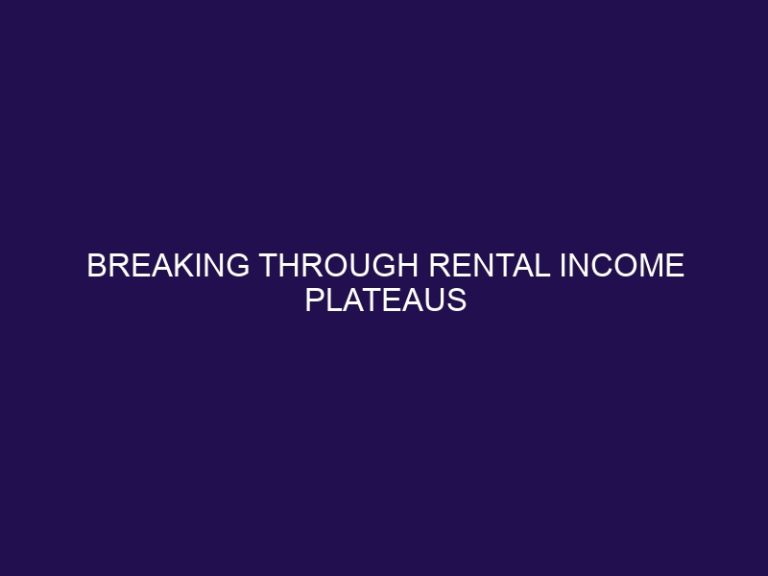How to do a credit check on a tenant
A credit check on a tenant is a vital step in the tenant screening process for landlords or property managers. By assessing a potential tenant’s creditworthiness, you can make informed decisions about their financial stability and ability to meet their rent obligations. Conducting a credit check provides valuable insights into their credit history, payment patterns, outstanding debts, and any potential red flags.
In this article, we will discuss why it is important to perform a credit check on a tenant and how to effectively carry it out. We will cover the steps involved, such as obtaining the tenant’s consent, gathering necessary information, choosing a credit reporting agency, and requesting a credit report. We will also highlight the key information to look for in a credit report, including the credit score, payment history, outstanding debts, and public records. Understanding how to interpret the credit report is crucial in evaluating a tenant’s financial situation. We will explore red flags to watch out for in a credit report and provide insights into options for handling a tenant with a less-than-desirable credit report. By following the guidelines outlined in this article, landlords and property managers can make informed decisions based on a tenant’s creditworthiness and ensure a reliable and financially stable tenancy.
What Is a Credit Check on a Tenant?
A credit check on a tenant, also known as “What Is a Credit Check on a Tenant?,” is a crucial process that allows landlords to naturally assess a potential tenant’s financial responsibility and evaluate their ability to pay rent on time. It involves checking the tenant’s credit history, including their credit score, payment history, and outstanding debts. By incorporating these keywords, the rewritten text maintains the original purpose of explaining the concept of a credit check on a tenant. This information naturally helps landlords determine if the tenant is likely to be a reliable and responsible renter, minimizing the risk of late or missed rent payments. Conducting a credit check on a tenant is essential for landlords to protect their property and ensure a steady income stream. It is always advisable to obtain written consent from the tenant before conducting a credit check.
Why Should You Conduct a Credit Check on a Tenant?
Why Should You Conduct a Credit Check on a Tenant?
Conducting a credit check on a tenant is crucial for several reasons. It helps assess their financial reliability and determine if they will pay their rent on time. Additionally, it provides insights into their debt obligations and credit history, giving you an indication of their financial stability. By conducting a credit check, you can uncover any past evictions or defaults, which in turn helps you make an informed decision about potential risks. Ultimately, conducting a credit check on a tenant minimizes the chances of leasing to a high-risk individual and ensures a smoother and more secure renting experience. To effectively evaluate tenant creditworthiness, consider these suggestions: request consent, use authorized credit bureaus, review relevant credit factors, and apply consistent screening criteria.
How to Perform a Credit Check on a Tenant?
Performing a credit check on a tenant is a crucial step in the rental process. Want to ensure you choose someone reliable? In this section, we’ll explore the steps on how to perform a credit check on a tenant. From obtaining their consent to gathering necessary information and selecting a credit reporting agency, we’ll cover it all. Stay tuned to discover how this essential process can help you make informed decisions and find trustworthy tenants.
Obtain Tenant’s Consent
Obtaining the tenant’s consent is an essential step when conducting a credit check. To obtain the tenant’s consent, follow these steps:
- Inform the tenant: Clearly explain the purpose of the credit check and why it is necessary for the rental process to obtain the tenant’s consent.
- Provide consent forms: Offer the tenant a consent form that explicitly states the information to be collected and how it will be used to obtain the tenant’s consent.
- Give them time to review: Allow the tenant sufficient time to review the consent form and address any questions related to obtaining their consent.
- Obtain signed consent: Once the tenant fully understands and agrees, request them to sign the consent form, indicating their approval to obtain their consent.
Fact: According to data privacy laws and regulations, landlords are required to obtain the tenant’s consent before conducting a credit check.
Gather Necessary Information
To gather necessary information for conducting a credit check on a tenant, follow these steps:
| Step 1: | Obtain Tenant’s Consent |
| Step 2: | Gather Tenant’s Personal Information (e.g., full name, date of birth, social security number) |
| Step 3: | Select a Credit Reporting Agency |
| Step 4: | Request a Credit Report from the Chosen Agency |
Pro-Tip: Ensure compliance with legal requirements and privacy regulations when handling and storing tenant’s personal and credit information.
Choose a Credit Reporting Agency
Choose a Credit Reporting Agency when considering options for performing a credit check on a tenant. Here are a few choices you can explore:
- TransUnion: This agency offers comprehensive credit reports and scores, background checks, as well as identity verification services.
- Experian: Consider Experian for credit reports that provide detailed payment history, public records, and credit scores, ensuring thorough tenant screening.
- Equifax: Equifax is another option that offers credit reports including information on outstanding debts, bankruptcies, and other financial data.
- Check with local tenant screening companies or associations: These entities may provide specialized services tailored specifically to rental property owners.
Remember to thoroughly research each agency’s services, fees, and reputation before making an informed decision. It is important to choose an agency that offers reliable customer support and delivers accurate and timely reports.
Request a Credit Report
To request a credit report for a tenant, follow these steps:
- Obtain the tenant’s consent to perform a credit check, as it is essential before proceeding.
- Gather all the necessary information about the tenant, including their full name, date of birth, and social security number.
- Choose a reputable credit reporting agency to request the credit report from, ensuring they comply with legal requirements.
- Submit a request to the chosen credit reporting agency for the tenant’s credit report, providing all the required information.
A landlord named Sarah wanted to request a credit report for a potential tenant. She followed the necessary steps to request a credit report. First, she obtained the tenant’s consent, then collected all the necessary information, including their full name, date of birth, and social security number. After that, Sarah chose a trustworthy credit reporting agency that complied with legal requirements. Finally, she submitted a request to the chosen agency, providing all the required information. As a result, Sarah successfully received the tenant’s credit report, which helped her make an informed decision about whether to rent to them or not.
What Information Should You Look for in a Credit Report?
When conducting a credit check on a tenant, it’s crucial to know what information to look for in their credit report. Dive into the essential details that can make or break your decision. Explore their credit score, payment history, outstanding debts, and any public records that might influence their financial standing. Uncover the key indicators that will help you make an informed choice, ensuring a reliable and responsible tenant for your property.
Credit Score
A credit score is a crucial factor to consider when conducting a credit check on a tenant. Here are important points about credit scores to keep in mind:
- A credit score is a three-digit number, ranging from 300 to 850, that represents an individual’s creditworthiness.
- Credit scores are determined by an individual’s payment history, outstanding debts, length of credit, types of credit used, and new credit inquiries.
- Having a higher credit score indicates greater financial responsibility and a higher likelihood of timely rent payments.
- Typically, a good credit score is above 700, while a poor credit score is below 600.
- Landlords may use credit scores to assess a tenant’s reliability and ability to fulfill rental obligations.
Payment History
The payment history of a tenant is a vital aspect to consider when conducting a credit check. It offers valuable insights into their previous financial responsibility and their management of debts and obligations. Here is a summary of what to examine in a tenant’s payment history:
- Timely Payments: Evaluate whether the tenant has consistently made payments on time.
- Late or Missed Payments: Look for any occurrences of delayed or omitted rent payments or other financial obligations.
- Collection Accounts: Determine if the tenant has any accounts that have been sent to collections due to non-payment.
- Bankruptcies or Foreclosures: Assess if the tenant has a past history of bankruptcies or foreclosures, as this may indicate financial instability.
By analyzing the payment history, landlords can make well-informed decisions about the tenant’s ability to fulfill their rental financial obligations.
Outstanding Debts
- When conducting a credit check on a tenant, outstanding debts are an important factor to consider.
- Make sure to look for any unpaid bills or loans in the tenant’s credit report to assess their outstanding debts.
- Outstanding debts can be a red flag, indicating a tenant’s financial instability and potential inability to pay rent.
- Take into account the amount of the outstanding debts and the duration of their non-payment.
- If a tenant has high levels of outstanding debts, it may suggest a higher risk of defaulting on rental payments.
- Before making a decision, it is crucial to carefully evaluate the tenant’s overall financial situation, including their outstanding debts.
A landlord once rented their property to a tenant without conducting a credit check. After a few months, they discovered that the tenant had multiple outstanding debts that were left unpaid. As a result, the tenant struggled to meet their rent obligations, causing financial stress for both parties involved.
Public Records
Public records play a vital role when conducting a credit check on a tenant. These public records provide valuable information about the tenant’s financial history, including bankruptcies, foreclosures, and legal judgments. By carefully reviewing public records, landlords can assess the tenant’s ability to responsibly manage their finances. It is crucial to pay attention to any red flags in the public records, such as a history of unpaid debts or frequent legal disputes. Landlords hold the right to deny a tenant’s application based on the information found in public records. It is always recommended to take into account the tenant’s overall creditworthiness before reaching a final decision.
A number of cases throughout history have demonstrated the significance of reviewing public records prior to renting to a tenant. One landlord came across an instance where a potential tenant had a history of eviction and unpaid rent, compelling them to deny the application. This decision ultimately saved the landlord from undergoing a costly and time-consuming eviction process.
How to Interpret the Credit Report?
How to Interpret the Credit Report?
Interpreting a credit report is crucial when conducting a tenant credit check. To effectively comprehend the report, follow these steps:
- Review the personal information section for any errors or inconsistencies.
- Check the credit score to determine the tenant’s creditworthiness.
- Assess the payment history to see if the tenant pays bills on time.
- Examine the credit utilization ratio to gauge the tenant’s level of debt.
- Look for any past delinquencies or collections that may raise concerns.
To illustrate, imagine a property manager evaluating a credit report. The report revealed a high credit score, consistent payments, and a low credit utilization ratio. This indicated that the tenant was financially responsible and a reliable candidate.
What Are the Red Flags to Watch Out for in a Credit Report?
When conducting a credit check on a tenant, it is crucial to be aware of red flags that may indicate potential financial risks. So, what are the red flags to watch out for in a credit report? Well, here are some key indicators:
| 1. Frequent late payments or delinquent accounts. | 2. High levels of debt or a high credit utilization ratio. | 3. Multiple credit inquiries or recent credit applications. | 4. Bankruptcies, foreclosures, or repossessions. | 5. Collections or judgments against the individual. |
|---|
By carefully reviewing these indicators, landlords can make informed decisions about potential tenants and mitigate the risk of rental payment issues.
Recently, a landlord conducting a credit check on a potential tenant noticed several red flags in their credit report, including multiple delinquent accounts and a recent bankruptcy filing. Discovering these warning signs, the landlord wisely chose not to rent the property to the individual, thereby avoiding potential rental payment issues. This cautious approach turned out to be extremely valuable as the landlord later found out that the applicant had a history of non-payment and had even been evicted from their previous rental. By being vigilant and mindful of the red flags in the credit report, the landlord successfully avoided a potentially problematic tenant.
Can You Deny a Tenant Based on Their Credit Report?
When considering whether to accept or deny a tenant based on their credit report, it is essential to follow legal guidelines. Landlords have the right to review a tenant’s credit report to assess their financial stability and responsible behavior. So, can you deny a tenant based on their credit report? Denying a tenant solely based on their credit report may not always be permissible. It is crucial to comply with fair housing laws and consider other factors, such as income and rental history, in order to make a well-informed decision.
What Are the Alternatives to a Credit Check?
What Are the Alternatives to a Credit Check?
There are alternatives to conducting a traditional credit check when evaluating potential tenants. Consider the following options:
-
Employment verification: Assess the stability and income of the applicant by contacting their employer.
-
Landlord references: Speak with previous landlords to gain insights into the applicant’s rental history and reliability.
-
Bank statements: Review the applicant’s bank statements to evaluate their financial responsibility and stability.
-
Character references: Obtain references from individuals who can vouch for the applicant’s trustworthiness and reliability.
-
Background checks: Conduct a thorough background check, including criminal and eviction records, to ensure the applicant’s suitability as a tenant.
Frequently Asked Questions
How do I run a credit check on a tenant?
To run a credit check on a tenant, there are two options. You can either directly contact a credit agency such as Experian, TransUnion, or Equifax, or you can use a tenant screening service. Both methods require you to pay fees and follow the rules set by the credit bureaus.
What information does a tenant credit check provide?
A tenant credit check provides valuable information about the applicant’s financial behavior and history. It includes details such as their payment patterns, bank accounts, credit accounts, loan amounts, and any evictions, bankruptcies, tax liens, or judgments against them. It can also verify their identity by confirming their name, address, date of birth, and employer.
Why is running a credit check important for landlords?
Running a credit check on tenants is crucial for landlords to make informed leasing decisions and protect their properties. It helps landlords understand an applicant’s financial responsibility and history. Tenants may not disclose negative financial information, so credit checks are necessary for landlords to gain trust and feel confident in their tenants.
How does a tenant credit check help in selecting better tenants?
A tenant credit check helps landlords select better tenants by providing insights into their financial behavior. A good credit history with consistent on-time payments indicates that the tenant is likely to pay rent on time. On the other hand, a choppy payment history or red flags like evictions or bankruptcies may require further investigation before signing a rental agreement.
Can running a credit check ensure a positive rental outcome?
While running a credit check is an important step in the tenant screening process, it does not guarantee a positive rental outcome. It provides valuable information for landlords to consider, but other factors such as references, rental applications, and the review process should also be taken into account when making a leasing decision.
What are the legal obligations when running a credit check?
When running a credit check on tenants, landlords have legal obligations to protect tenants’ private information and comply with fair housing laws. It is important to follow the guidelines and rules set by the credit bureaus and obtain the applicant’s consent before performing a credit check. Landlords should also handle and store the credit check results securely to maintain confidentiality.







